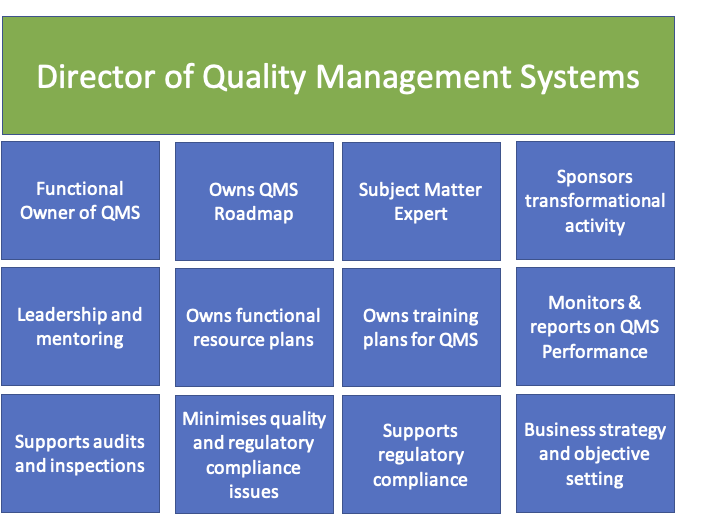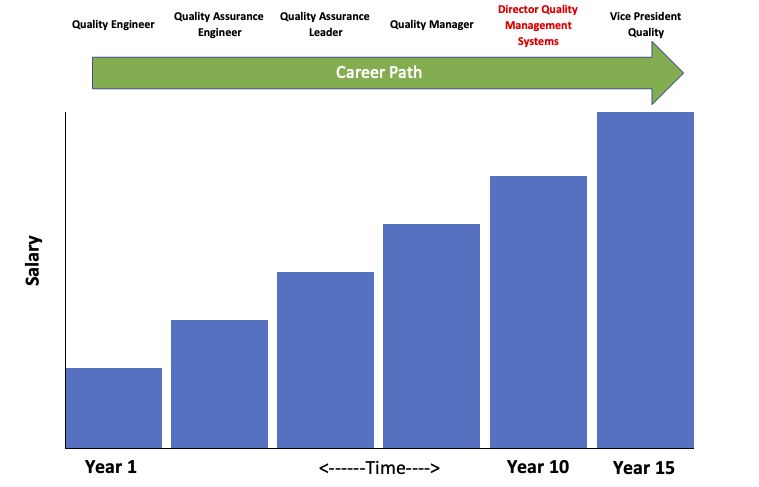The Director of Quality Management Systems is a leadership role employed by some organizations and is active within a business’s Quality function.
The role is a leadership role with senior levels of responsibility and is responsible for directing the development, implementation and performance of an organization’s quality management systems and associated activities.
This includes a range of activities, from aligning the organization’s QMS to business needs, leading certification activities, providing functional leadership and co-ordinating business objectives & strategies with other leadership members.
In today’s article, we’ll take a look at this role, day-to-day activities and how you might structure your career path if you aspire to this role; we’ll be covering:
- What is a Director of Quality Management Systems
- What does a Director of Quality Management do
- Common characteristics of a Director of Quality Management Systems
- What qualifications do you need to become a Director of Quality Management systems
- What is the likely career path?
- How much does a Director of Quality Management Systems earn?
- How long does it take to become a Director of Quality Management Systems?
What is a Director of Quality Management Systems
Quality in most businesses is characterized by a hierarchical functional organization which is responsible for numerous tasks, from compliance, management systems, and control to continuous improvement.
One common thread that underpins quality in all organizations is the management system that it deploys.
In some organizations, the responsibility for a highly effective Quality Management System is designated to a specific member of the Quality Leadership – the Director of Quality Management Systems.
This role is responsible for managing all activities pertaining to the development, implementation and monitoring of Quality Management Systems (QMS) within an organization.
The role is a leadership role and, as such, is highly visible within the organization. The incumbent will interact with all layers, providing leadership and vision for the direction of the Quality Management System and helping to develop wider business strategy.

Directors of Quality Management Systems are often found in large complex businesses where alignment of QMS activities to strategic goals plays a significant importance in achieving business objectives.
This role is not used everywhere; some organizations choose to subsume the management of QMS within other leadership roles (such as the Quality Director). By clearly delineating ownership of the QMS, however, there are some specific benefits that can be achieved; these include:
- Singular leadership role responsible for management systems across the organization
- Clear interface with regulatory bodies
- Compliance importance underpinned by Leadership role
- Customer reference for process issues
- Leadership focus on aligning business strategy, QMS and performance goals
The incumbent is often responsible for driving change within a business and, as a result, requires strong interpersonal skills and the ability to lead projects and teams in order to deliver objectives.
As a leadership role, it’s highly likely that the incumbent will have subordinates (some senior) upon which certain aspects of the execution of the quality management system will be delegated.
They are likely to be the functional owner of the QMS within the business and, as such, hold responsibilities which include ensuring the production of policies and procedures supporting specific needs and goals within the business.
There is also an expectation that this role will help support compliance activities.
What does a Director of Quality Management do?

While this will vary from one organization to another, based on the size and complexity of the business, there are some common themes undertaken by the role, which include:
- Establish and deploy a Quality Management System that aligns with strategic business goals.
- Develop and own the Quality Management System Roadmap, including resourcing and action plans
- Act as business Subject Matter Expert for all things relating to the QMS
- Lead / Sponsor transformation activities that relate to QMS deployment.
- Provide functional leadership and mentoring
- Lead the execution of resourcing plans that support the effective administration of the QMS.
- Be responsible for the successful execution of training plans with regard to policies, processes, and procedures.
- Monitor the performance of the QMS
- Provide regular performance reporting and data as required to the business
- Support the organization with audits and inspections as they relate to Quality Management Systems, providing leadership and support to external certification interactions
- Interface with Regulatory Agencies
- Ensure the absence of significant quality issues and regulatory compliance actions by stakeholders through the design and governance of robust, efficient, and consistent processes and systems.
- Develop and deploy internal audit programs and inspections that aim to minimize quality and compliance issues.
Common characteristics of a Director of Quality Management Systems
Given what we have already written, it’s clear that this role requires an experienced professional that is well-versed in deploying and optimizing management systems.
This requires a range of hard and soft skills, including:
- Extensive experience in developing quality management systems that result in a highly optimized business.
- Strategic thinker, able to develop a long-term roadmap that aligns the QMS to short and long-term goals and objectives.
- Highly effective communicator
- Recognizes the importance of and effectively manages change
- Has appropriate gravitas when dealing with customers, certification bodies
- Has broad industry and functional experience that facilitates business optimization
- Excels at people management (Strong interpersonal and organizational skills) across the whole enterprise
- Demonstrable complex problem-solving skills by using appropriate tools and techniques
- Able to recognize skills gaps within the business and equips the organization through effective upskilling.
What qualifications/experience do you need to become a Director of Quality Management systems?
While entry requirements may vary from one company to another, some common qualification/experience requirements include:
- Bachelor’s degree in a relevant discipline (i.e.business, Operations Management, Engineering)
- MBA in relevant discipline
- 10+ years experience in appropriate industrial sector
- Robust experience in achieving compliance to wide-ranging and complex standards
- Management Qualificaiton
- Change Management qualification (i.e. APMG Change Management)
- Formal Project Management training
- Demonstrable experience in managing teams
- Strong working knowledge of applicable industry standards
There is also a range of soft skills that will be a deemed requirement; these include:
- Strong leadership skills
- Strong communication skills
- Strong stakeholder management (including influencing, collaboration, and relationship building)
- Highly effective at solving solve complex problems
- Working under own initiative
- Strong planning skills
- Change Management
What is the likely career path?
As a leadership role, any incumbent will be expected to have served time in junior and middle management roles gaining the skills and experience required.
There are likely to be multiple paths that lead to the role of Director of Quality Management Systems; these include:
- Within industry
- Within consultancy or certification bodies
The industry path presents a common career path, bourn from typical role advancement where as entry from a consultancy or certification body may be primarily driven by experience.
How much does a Director of Quality Management Systems earn?
Earnings are likely to vary depending on the size and complexity of the business together with the size of functional responsibility; however, salary in a medium size organization should expect to be well into six figures.
How long does it take to become a Director of Quality Management Systems?
This will largely depend on the expectations of the hiring organization.

Key to the role will be the need to have a demonstrable experience that enables the applicant to successfully deliver the requirements of the job.
Many organizations will expect 5-10 years of experience in developing and deploying QMS’s within large organizations. This path is likely to include middle management roles providing the experience of leadership and running a team.
This may be exacerbated by expectations of the holding of other leadership roles that are able to demonstrate business transformation. This may require a career path that spans 10-15 years.
